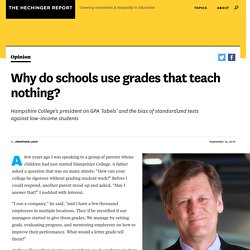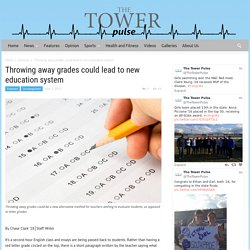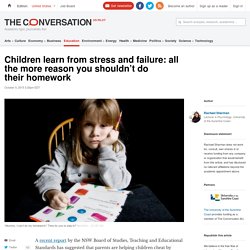

Wglt. Parents: let your kids fail. You’ll be doing them a favor. Your teenager has a science project due.

He hates science. He hates projects (as do you). Do you: A. Set deadlines for him, get the necessary materials, lay them out on the table with some homemade chocolate chip cookiesB. Why Writers Are the Worst Procrastinators. When I started asking around about this phenomenon, I was a bit skeptical.

After all, us old geezers have been grousing about those young whippersnappers for centuries. But whenever I brought the subject up, I got a torrent of complaints, including from people who have been managing new hires for decades. They were able to compare them with previous classes, not just with some mental image of how great we all were at their age. And they insisted that something really has changed—something that’s not limited to the super-coddled children of the elite.
What We’ve Gotten Wrong About the Fail Forward Movement. Mistakes are forgivable, if one has the courage to admit them. — Bruce Lee.

Why do schools use grades that teach nothing? A few years ago I was speaking to a group of parents whose children had just started Hampshire College.

A father asked a question that was on many minds: “How can your college be rigorous without grading student work?” Before I could respond, another parent stood up and asked, “May I answer that?” Abolishing Grading. I have had a number of people ask me to share a 'table-of-contents' for my blog posts on why and how we should abolish grading.

Here is a list of blog posts that should help you gain insight into this whole abolishing grading topic. Want To Know What's Wrong With Averages? - Work in Progress. Although playing the averages is a safe way of getting to the middle, it isn't an effective way of showing student learning.
There is an editing error in the article: "Consider using a decaying average rather than a regular one that takes the most recent iteration of the learning of a standard and places more weight upon it." It is a decaying average which places more weight upon the most recent iteration, not a regular average. A regular average places the SAME weight on all attempts in the timeline. – anonytw33t

Throwing away grades could lead to new education system. By Chase Clark ’18│Staff Writer It’s a second hour English class and essays are being passed back to students.

Rather than having a red letter grade circled on the top, there is a short paragraph written by the teacher saying what was done well by the student and what needs improvement. “Throwing away” grades is a newer concept with teachers around the country that aims to give students written evaluations with feedback on what they did right or wrong, instead of a letter grade. Letter Grades Deserve an 'F' Letter grades are a tradition in our educational system, and we accept them as fair and objective measures of academic success.

However, if the purpose of academic grading is to communicate accurate and specific information about learning, letter, or points-based grades, are a woefully blunt and inadequate instrument. Worse, points-based grading undermines learning and creativity, rewards cheating, damages students' peer relationships and trust in their teachers, encourages students to avoid challenging work, and teaches students to value grades over knowledge. Why You Shouldn't Do Your Child's Homework. A recent report by the NSW Board of Studies, Teaching and Educational Standards has suggested that parents are helping children cheat by completing their school homework, and has called for this issue to be addressed.

But does helping your child with homework hinder their progress? The answer to this question is not simple. So far, research on the subject has been mixed, finding that different types of parental involvement in homework have different relationships to achievement. For example, are you motivated to help your child because you are worried they will fail, or how their performance might reflect upon you? Are you concerned they may miss out on longer-term goals (like university entry) unless you take over some tasks for them?
Isn't it time to eliminate grades in education? Grading for Mastery and Redesigning My Gradebook. For the last two years, I’ve been increasingly frustrated with the traditional approach to assessing students and reporting grades. I want my students to value learning, not the accumulation of points. Unfortunately, I feel like school is akin to a Pacman game where students are myopically focused on gobbling up points and, as a result, miss the point of learning entirely. Redesigning My Gradebook This year I decided to overhaul my gradebook and assess students based on their mastery of particular skills, also referred to as standards-based grading. Instead of organizing my gradebook using traditional categories (e.g. homework, classwork, projects, tests, and projects), I identified the main skills we would be focusing on developing in this class and used those to create my gradebook categories.
Wire Side Chats: How Can Teachers Develop Students' Motivation. What can teachers do to help develop students who will face challenges rather than be overwhelmed by them?

Why is it that many students seem to fall apart when they get to junior high or middle school? Can the "gifted" label do more harm than good? Do early lessons set girls up for failure? Is self-esteem something that teachers can or should "give" to students? Those are some of the questions Carol Dweck, professor of psychology at Columbia University, answers for Education World.
Carol S. Dweck shares with Education World readers some of her thoughts about the role of motivation in learning. WOOP to and through college. Wish What is your most important academic Wish or concern? Pick a Wish that is challenging for you but that you can fulfill. Note your Wish in 3-6 words! Outcome. The Making of an Expert. Thirty years ago, two Hungarian educators, László and Klara Polgár, decided to challenge the popular assumption that women don’t succeed in areas requiring spatial thinking, such as chess.
They wanted to make a point about the power of education. The Polgárs homeschooled their three daughters, and as part of their education the girls started playing chess with their parents at a very young age. Their systematic training and daily practice paid off. Focus on the Process and Results Will Follow. As I explored the correlation between great coaching and great teaching while interviewing highly successful sports coaches for a book about what teachers can learn from them, a common theme surfaced repeatedly. Several coaches stressed the importance of emphasizing the process rather than the results. This approach may seem counterintuitive, especially given the unprecedented emphasis on testing and performance in education today.
However, the process-oriented approach to teaching and learning falls in line nicely with classroom instructional goals such as growth mindset and mastery. Because teachers are generally compliant, they will work diligently to produce the scores and performance that states, districts, and school leadership demand. Perhaps, though, teachers need more leaders who can help emphasize the process in teaching and learning while de-emphasizing the performance.
The Problem. Failure Is Essential to Learning. One of my favorite things to say when doing strategic planning with teachers is that the plan has a 50 percent chance of success and a 100 percent chance of teaching us how to get "smarter" about delivering on our mission. I love saying this because it conveys an essential truth: Failure is not a bad thing. It is a guaranteed and inevitable part of learning. In any and all endeavors, and especially as a learning organization, we will experience failure, as surely as a toddler will fall while learning to walk. Unfortunately, in education, particularly in this high-stakes accountability era, failure has become the term attached to our persistent challenges. Wholesale problems, such as the achievement gap and the high school dropout rate, are labeled as "education failures.
" Making Failure Harder Work Than Passing. The Decline of Play and Rise in Children's Mental Disorders. Declining Student Resilience: A Serious Problem for Colleges.